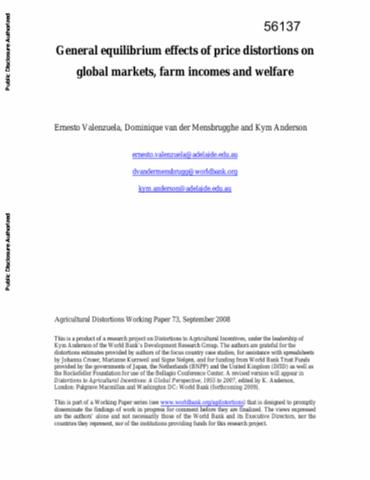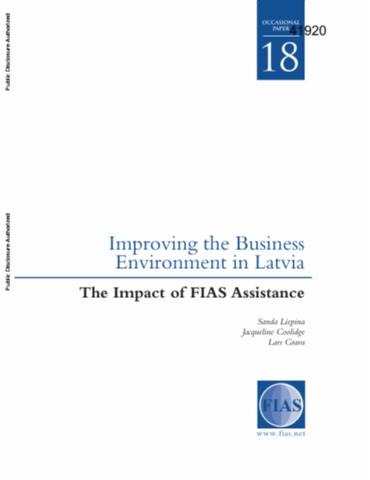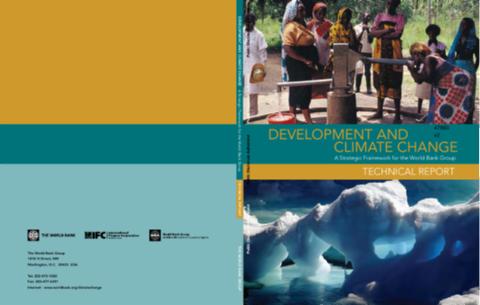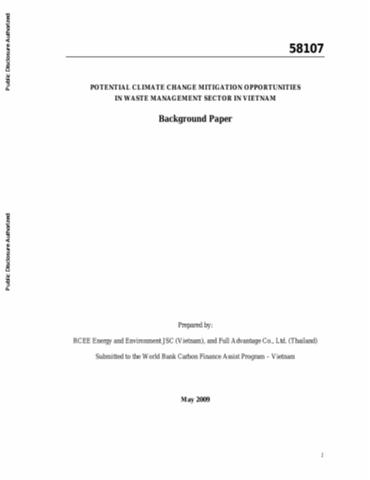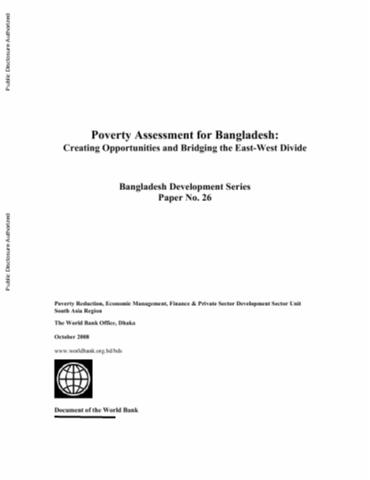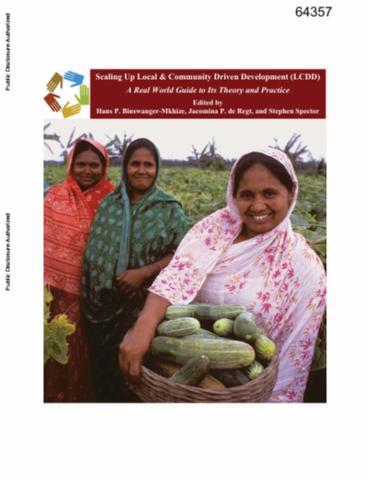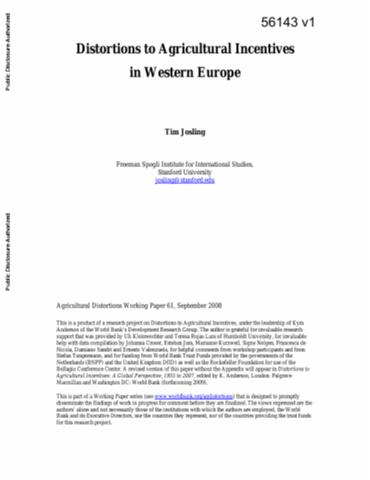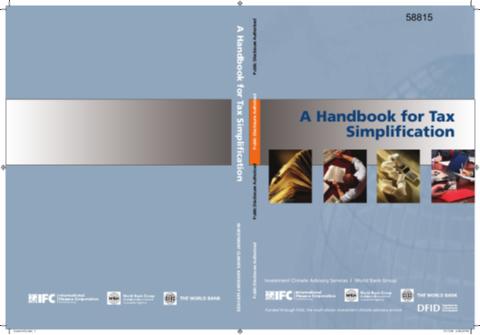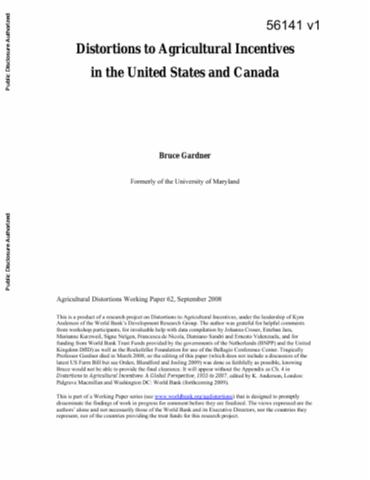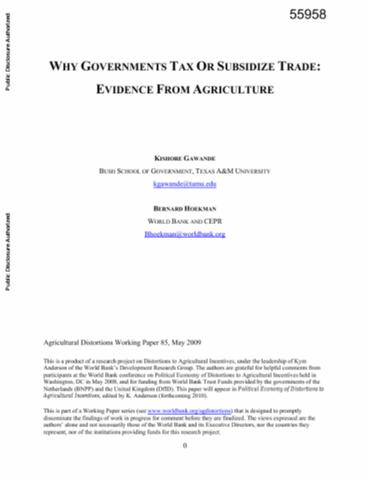
Topics and Regions
Details
Location
Contributions
Displaying 41 - 50 of 630General Equilibrium Effects of Price Distortions on Global Markets, Farm Incomes and Welfare
Earnings from farming in many developing countries have been depressed by a pro-urban bias in own-country policies as well as by governments of richer countries favoring their farmers with import barriers and subsidies. Both sets of policies, which reduce national and global economic welfare and contribute to global inequality and poverty, have been undergoing reform since the 1980s.
Improving the Business Environment in Latvia
This paper tracks the process through which FIAS, the investment climate advisory service of the World Bank Group advised the government of Latvia from 1998 to 2004 on ways to improve the business environment, achieve higher rates of economic growth, and thereby alleviate poverty. This case study shows that it is reasonable to describe how assistance by FIAS led to an improved business environment.
Development and Climate Change
This strategic framework serves to guide and support the operational response of the World Bank Group (WBG) to new development challenges posed by global climate change. Unabated, climate change threatens to reverse hard-earned development gains. The poorest countries and communities will suffer the earliest and the most. Yet they depend on actions by other nations, developed and developing. While climate change is an added cost and risk to development, a well-designed and implemented global climate policy can also bring new economic opportunities to developing countries.
Potential Climate Change Mitigation Opportunities in Waste Management Sector in Vietnam
Along with economic growth and improved living standards, waste from households, industries, and commercial or service establishments is expected to increase rapidly over the next years. Managing this waste is a hard challenge for the Government of Vietnam because of its substantial cost and lack of awareness and participation of people and businesses. Wastes can be classified according to: their form (wastewater, solid waste); their origin (industrial wastes, agricultural wastes, urban (municipal) wastes); and their hazardous nature (non-hazardous or hazardous).
Poverty Assessment for Bangladesh
Bangladesh has made good progress in reducing poverty over the past decade despite the series of external shocks which have routinely affected the country. Poverty fell from 49 percent in 2000 to 40 percent in 2005, propelled by respectable economic growth and relatively stable inequality. These statistics are reflected in tangible improvements in poor people's lives, such as a sharp reduction in those living under flimsy straw roofs in rural areas.
Scaling up Local and Community Driven Development
Local and Community Driven Development (LCDD) is an approach that gives control of development decisions and resources to community groups and representative local governments. Poor communities receive funds, decide on their use, plan and execute the chosen local projects, and monitor the provision of services that result from it. It improves not just incomes but people's empowerment and governance capacity, the lack of which is a form of poverty as well. LCDD operations have demonstrated effectiveness at delivering results and have received substantial support from the World Bank.
Distortions to Agricultural Incentives in Western Europe
Agriculture in Western Europe enjoys a degree of diversity that reflects a wide variety of soils and climatic conditions ranging from the arid Mediterranean regions to the Arctic Circle. Superimposed on this natural diversity is the complexity of different social, economic and political conditions in the eighteen countries that are the subject of this chapter.
A Handbook for Tax Simplification
The purpose of this handbook is to provide policy makers with a framework to assess a tax system in its entirety, measure its various parameters and how it is administered, and defines best practices for tax policy and administration that will yield a tax system that is simple and predictable and does not create an undue burden on private enterprise. This handbook is primarily designed for policy makers and tax practitioners. The goal is to analyze the impact of income tax, the value added tax (VAT), and other local taxes that are imposed on business.
Distortions to Agricultural Incentives in the United States and Canada
There is much in common between the agricultural sectors of the United States and Canada. This chapter begins with a brief background on the two sectors, then reviews their histories of farm policy developments before reporting new estimates of rates of assistance to their farmers and their consequences for taxpayers and consumers. This is followed by an explanation of the politics behind the evolution and gyrations in farm policies in the two countries, and some speculation on the prospect for reform.
Why Governments Tax or Subsidize Trade
This paper empirically explores the political-economic determinants of why governments choose to tax or subsidize trade in agriculture. The authors use a new data set on nominal rates of assistance (NRA) across a number of commodities spanning the last five decades for 64 countries. NRAs measure the effect on domestic (relative to world) price of the quantitative and price-based instruments used to regulate agricultural markets. The data set admits consideration of both taxes and subsidies on exports and imports.

